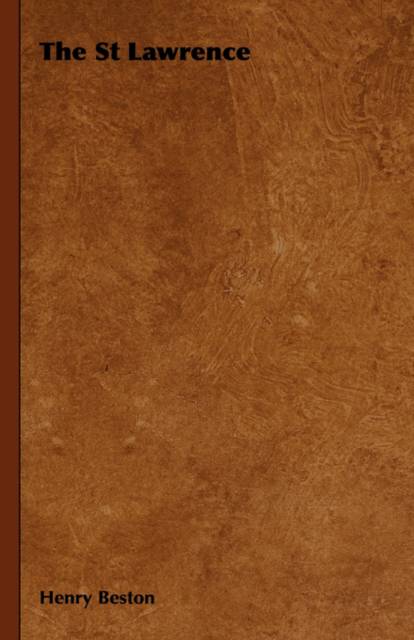
- Retrait gratuit dans votre magasin Club
- 7.000.000 titres dans notre catalogue
- Payer en toute sécurité
- Toujours un magasin près de chez vous
- Retrait gratuit dans votre magasin Club
- 7.000.000 titres dans notre catalogue
- Payer en toute sécurité
- Toujours un magasin près de chez vous
Description
THE RIVERS OF AMERICA Edited by STEPHEN VINCENT BENET and CARL CARMER. Preface: In writing this book I have tried first and foremost to keep my eyes on the river itself. It is not a chronological or anecdotal history of Laurentian Canada where men and events appear in these pages they have seemed to me to have a living relation to the river. I have divided the book in the following manner: the first third is concerned with the past, the second with the present, and the last third with the almost timeless forces of nature neighboring the river and its coasts. The reader will find that the book largely concerns it self with the French regions of the St. Lawrence, for there is the river at its greatest and there is human life most shaped by its presence and influences. Perhaps above all what I have tried to give is a sense of the St. Lawrence as a part of the scale and vastness of our North America. Living in eastern Maine and scarce two hundred miles from what we all call the line, I have long been familiar with the river and its people. The uninhabited range of the frontier separates our completely different worlds but the north which is our common inheritance makes us neighbors. The world of Katahdin and the white pine and the world of the Mont Ste. Anne and the dense spruce both know what it is like when the northeaster darkens the alrjafidy darkened twilight with the thickening onrush of the snow. During the course of these last few years, I have sought out many to each side of the line and wish to thank them here for the courtesy and particular good will with which they gave me every help and aid. Village cures of the river parishes, university scholars, busy librarians, officials at Ottawa and Quebec, boatmen, eel catchers, farmers, and woodcutters how friendly they all were. Beginning at home, I wish to thank my wife, Elizabeth Coatsworth Beston, my companion in so many of these adventures, for her unfailing help and wisest counsel, for her encouragement and her adventurous willingness to try the road ahead. I wish to thank my friend the Abbe Albert Tessier who welcomed me to the river and gave me the letters and good counsel which opened so many a door. I would thank my friend Dr. D. A. Dery of Quebec, founder of the Societe Provancher the society which preserves and studies the great world of nature on the river to him and to his scientific knowledge so genially and freely given I confess a very great obligation. I would thank my friend Miss Hazel Boswell of Quebec for sharing with me her profound and sympathetic insight into the spirit of the habitant world and its legends.
Spécifications
Parties prenantes
- Auteur(s) :
- Editeur:
Contenu
- Nombre de pages :
- 292
- Langue:
- Anglais
Caractéristiques
- EAN:
- 9781443731379
- Date de parution :
- 04-11-08
- Format:
- Livre relié
- Format numérique:
- Genaaid
- Dimensions :
- 140 mm x 216 mm
- Poids :
- 517 g







